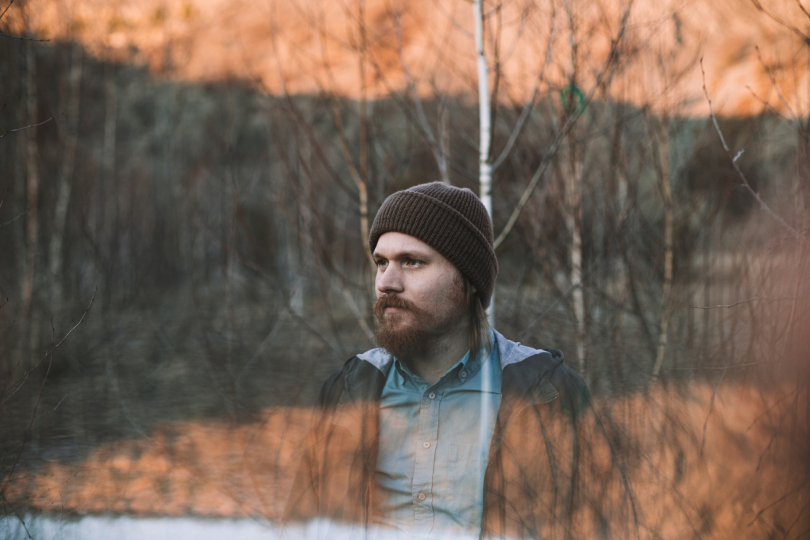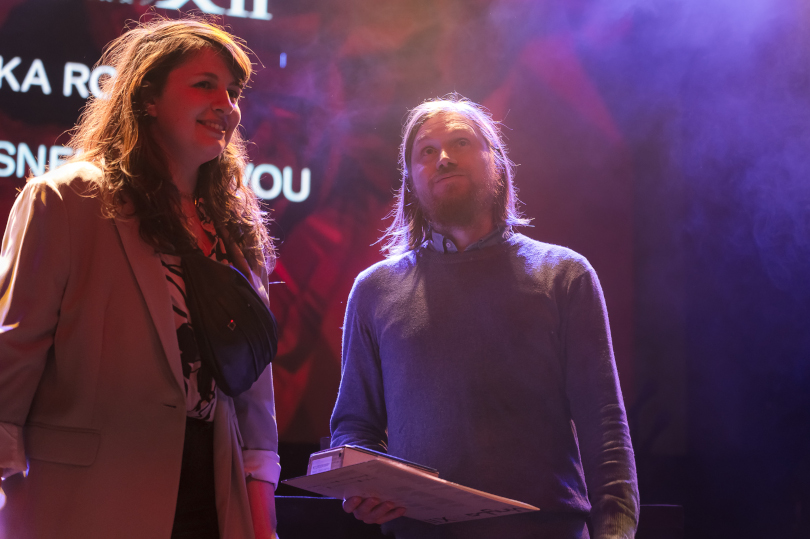
Tomáš Niesner: I Can’t Sit Down at a Desk and Write a Song
Brno-based guitarist Tomáš Niesner, known for the bands Unna and Vlněna and his duo with Jakub Šimanský, impressed listeners and critics last year with his instrumental album Bečvou. It was based on Tomáš's sound diary from a trip he took along the ecological disaster-stricken river Bečva in the Czech Republic. The album also dominated this year's Vinyla Music Awards and won Record of the Year. "I was surprised that something like experimental electronic music could get the award. I see it as a precedent for appreciating other fringe stuff," says Tomáš Niesner.
Tomáš, what made you start your solo career a few years ago?
I think all things have their time. I used to give all my energy to bands, so I didn't think much about solo work. Gradually the situation changed and I needed to move on. Jakub first inspired me with acoustic guitar and I also started working for Bastl Instruments, which was a unique opportunity to get in touch with electronics. Then everything got enhanced with covid when there was suddenly an opportunity to work on my own recordings.
On your solo albums, you play the acoustic guitar. How difficult was the transition to "acoustic" for you?
My first guitar was acoustic. I later saved up for an electric guitar and started looking for someone to start a band with. I played primarily with a pick. I only recently learned to strum with more fingers. That took me a couple of years. I am not prodigiously talented, and I've also been paying for a long-ago decision to play like most people, even though I'm left-handed.
The genre "American primitive guitar" is often mentioned in connection with your recordings, especially the Aurora album. How did you get into American primitivism and what makes it appeal to you?
Jakub Šimanský was the first person who not only introduced me to the genre but also demonstrated it to me. You could get something new out of the guitar with a relatively easy technique and the simple trick of open tuning. The genre of American primitivism played an important role for me, especially in this early period. I was quite influenced by players like Jack Rose and Robbie Basho, for example. At the same time, there is a small but quite active group of other guitarists here in Europe. I don't set myself apart from them, nor do I claim to be doing anything innovative. But rather than imitating schemes, I am interested in finding my own approach.
You released your first solo record Silencia on the British label ACR. How did this opportunity come about?
ACR was founded by Adam Badí Donoval, who now runs the Warm Winters Ltd. label in Bratislava. At the time, I recorded a live performance with a modular synthesiser on SoundCloud. Adam was intrigued and wrote to me asking if I would like to collaborate on a cassette release. It took me about a year to put the material together.
Your last year's album Bečvou attracted a lot of attention. How was the concept of the sound journey along the hard-tested Moravian river born?
The idea gradually took shape and assumed various forms. Initially, I was mainly interested in the motif of wandering, which was most inspired by Werner Herzog's book On Walking in Ice. I set out on my journey and recorded my surroundings on my recorder and phone without much expectation or specific ideas. The whole thing didn't take shape until a few months later. I was a little worried then about critics saying that I was using the disaster to my own advantage. But it was something so personal that I felt an overwhelming need to process it.
How is someone who has a personal relationship with the river affected by what happened with the Bečva in 2020? Does sadness, anger or helplessness dominate your emotions?
It was quite a shock. I had no idea how to deal with it. There was a lot of despair, helplessness and sadness. I've been following the Bečva case and it's really bizarre. Respect to all those who are involved in any way, such as the people from Deník Referendum or the local fishermen.
What role does improvisation play in your work?
Is it possible to call it improvisation if I'm just trying things out, playing with sounds or relying on chance? In any case, this approach is much closer to my heart. There is a certain amount of preparation beforehand, but then I let myself be guided by feeling or intuition, which is another loaded concept, though. Simply put, I can't sit down at a desk and write a song, so I have to work differently.
You use field recordings on your albums, how are they made and with what purpose?
The use of field recordings is not random, they are connected to a place and always have a purpose and meaning within the song. I definitely don't consider myself an active sound hunter. When I hear something interesting or want to preserve a memory, I record it on my phone, but I rarely work with it further. I usually carry a recorder with me when I have a clearer idea about what I want to do. For now, I'm sticking to a more passive approach. I don't create the sounds myself and I don't interfere with the soundscape in any way. Making field recordings is a discipline on its own that some people do at a very professional level, which doesn't compare to my lo-fi approach. But I enjoy the process and the results.

The album Bečvou was voted Record of the Year at this year's Vinyl Awards. What does it mean to you?
For me, it was a big surprise that something like experimental electronics could get the award. I dare to say that I see it as a kind of precedent for appreciating other fringe stuff. I respect the Vinyla because it is the only Czech music award that focuses more on the independent scene and also runs other activities around it.
Your life takes place between Brno, where you live, and your cottage in Vysočina. I assume that you find the countryside more suitable for your creative work than the city, or is it the other way around?
When possible, I work wherever I can. The most important thing for me is peace and ideally solitude in one room so I can concentrate. Working on the computer or mixing can be done with headphones almost anywhere, but it's not very good for your ears. Luckily, I have a place in Brno where I can do most of that. I've been going to Vysočina to relax lately.
You've also performed in different types of environments. Do you enjoy switching between noisy clubs and intimate spaces?
There are fewer and fewer of those loud gigs and I honestly don't miss it that much.
Where and on what occasions can listeners see and hear you in the near future?
There are going to be many concerts. For example, I will play at the Slovak festival Hviezdne noci in Bytča on 17th June. If you are interested, I recommend you to follow my Bandcamp or Instagram, where I am constantly adding events.
Where will music take you in the future? Are you a visionary in this respect, or do you believe in fate?
I can't really predict that. I feel like I'm still at the beginning. I'm finishing other recordings or preparing for live shows right now, so I'm not really focusing on that at the moment. There are plenty of ideas and possibilities anyway, and more may come. I will try to distinguish the essential from the non-essential.
If you have found an error or typo in the article, please let us know by e-mail info@insounder.org.

